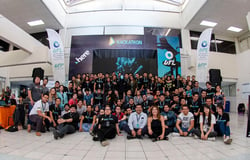Title
Projects Manager
Job Description
KEY RESPONSIBILITIES:
Project Management
- Plan, initiate, and oversee execution of all elements of a project, and often work with multiple internal teams, contractors, and clients.
- Handle discussions with a client and upper management to make sure they have a clear understanding of the client's desired goals and outcomes.
- Determine what resources, processes, and other materials will be necessary to complete the project in the desired timeline and draw up plans for each phase of execution.
- Delegating tasks or significant portions of the project to coordinators or teams of employees to help maintain a broad overall view of the entire project throughout.
- Responsible for the final quality of a project, thus ensuring it's delivered on time and to the client's satisfaction.
CORE RESPONSIBILITIES:
Planning is to establish business requirements, establish cost, schedule, list of deliverables, and delivery dates, establish resources plans and obtain management approval and proceed to the next phase.
- Scope planning – specifying the in-scope requirements for the project to facilitate creating the work breakdown structure.
- Prepare the work breakdown structure – spelling out the breakdown of the project into tasks and sub-tasks.
- Project schedule development – listing the entire schedule of the activities and detailing their sequence of implementation.
- Resource planning – indicating who will do what work, at which time, and if any special skills are needed to accomplish the project tasks.
- Budget planning – specifying the budgeted cost to be incurred at the completion of the project.
- Procurement planning – focusing on vendors outside your company and subcontracting.
- Risk management – planning for possible risks and considering optional contingency plans and mitigation strategies.
- Quality planning – assessing quality criteria to be used for the project.
- Communication planning – designing the communication strategy with all project stakeholders.
Organizing
Organizing is about assigning roles to the team members and setting deadlines to achieve targets.
- Set up your schedule management plan.
- Keep your project paperwork organized.
- Put your project management plan into action.
- Pay attention to progress with your project & schedule management plan.
- Make sure you are meeting your project management plan deadlines.
Leading
Leading is that broad role of ensuring the project team is aligned strategically and operationally.
- Coordinate with different people to ensure that the project goes on in a smooth manner.
- Keep a regular check on the project developments.
- Ensure that the project team members are meeting the deadlines and following the guidelines.
- Conducts meetings and makes that the team members do the follow-up actions.
- Make decisions at every stage of the project progress.
- Think about wide-ranging issues and make decisions accordingly.
- Build knowledge about the technical issues associated with the project.
- Demand excellence from their team members and help them in their personal development.
- Lead and motivate team members during the down phase and keep their morale high.
Monitoring
Monitoring is the process of keeping track of all project-related metrics including team performance and task duration, identifying potential problems and taking corrective actions necessary to ensure that the project is within scope, on budget and meets the specified deadlines (Measure, Evaluate and Correct)
- Real-time monitoring of team performance.
- Regular status and progress reports.
- Providing recommendations and suggestions.
- Ensuring that recommended actions are implemented.
Communicating
Communications Management includes the processes that are required to ensure timely and appropriate planning, collection, creation, distribution, storage, retrieval, management, control, monitoring, and the ultimate disposition of project information are communicated appropriately.
Managing Risk
It is the process used by project managers to minimize any potential problems that may negatively impact a project's timetable.
- Identify the Risk.
- Analyze the Risk.
- Prioritize the Risk.
- Assign an Owner to the Risk.
- Respond to the Risk.
- Monitor the Risk.
COMMUNICATIONS & WORKING RELATIONSHIPS:
Internal:
- Any departmental resource identified to have a role in the project
Reasons for Interaction:
- Appointed resource is required for the successful delivery of the project
External:
- Any external resource identified to have a role in the project
Reasons for Interaction:
- Appointed resource is required for the successful delivery of the project
QUALIFICATIONS, EXPERIENCE, & SKILLS:
Educational Qualifications:
- Matric
- Introduction to Project Management
- Advanced Project Management
- Any other Project Management related Qualification will be an added advantage.
Professional Qualifications
- B Com Degree or related qualification
- Certified Associate Project Manager (CAPM) Certification (PMI)
- Project Management Professional (PMP) Certification (PMI) will be an added advantage
Years of Experience
- 3 to 5 years project management work experience
Other requirements
- Technology and system savvy with a good understanding of IT and IT related practices and systems.
- Exposure in a corporate environment.
- Proven leadership experience.
- Working knowledge of transaction switching, POS systems and debit order processing advantageous
- Great Communicator with fluency in English is mandatory.
- Strong oral and written communications skills with good numeracy skills.
- Strong organisational and prioritisation skills to effectively manage resources.
- Excellent administrator with strong attention to detail.
- Ability to work in a fast-paced environment whilst still maintaining high levels of accuracy.
- Ability to maintain supreme levels of ethical behaviour and confidentiality.
- Ability to identify opportunities for improvement.
- Ability to Multi-Task.
- Flexibility to travel.
Behavioural Competencies
The incumbent is required to have demonstrated the following competencies:
1. Adaptability/Decisiveness
- Ability and confidence to vary between being flexible and holding firm on a decision, depending on what the situation requires.
- Showing leadership by adjusting one's approach to the demands of a particular task by taking and maintaining a position in a self-assured manner.
2. Initiative/Perseverance
- Ability to be willing to take action to address needs without being requested to do so.
- Staying on-task to completion, particularly in the face of obstacles or other trying circumstances.
3. Interpersonal Skills
- Ability to work effectively with different people and teams of people by putting others at ease.
- Acknowledging diverse opinions, addressing relevant concerns, minimizing conflict, promoting harmony.
- Cooperating with others and working toward consensual solutions to achieve the group's objectives.
4. Organizational Skills
- Ability to identify and set priorities, plan and effectively allocate appropriate resources.
- To attend to detail so that relevant issues are addressed and result in high-quality outcomes.
5. Stress Management
- Ability to work well under pressure or opposition, while maintaining effectiveness and self control in the midst of any one or combination of stressors, including emotional strain, ambiguity, risk to self and fatigue.
6. Valuing Service and Diversity
- Ability to be sensitive to client and community needs and perceptions by providing prompt, efficient and equitable service, involving clients and community in the resolution of problems that affect them.
Key project management skills:
- Communication: Clear and effective communication with team members, stakeholders, and clients is crucial for project success.
- Leadership: Inspiring and guiding the team to achieve project goals.
- Organization: Maintaining order and structure throughout the project lifecycle.
- Time management: Creating realistic schedules and timelines to meet project deadlines.
- Risk management: Identifying potential risks and developing strategies to mitigate them.
- Problem-solving: Identifying and addressing issues that arise during the project.
- Adaptability: Responding effectively to changing circumstances and unexpected challenges.
- Negotiation: Reaching agreements with stakeholders and resolving conflicts.
- Critical thinking: Analyzing situations logically and making informed decisions.
- Conflict resolution: Managing disagreements within the team and with external parties.
- Project planning: Developing a detailed project plan with defined tasks, timelines, and resources.
- Technical skills: Understanding the specific tools and methodologies relevant to the project.
Education
Languages
What We Do
Altron is a proudly South African technology group. We harness the power of data, technology and human ingenuity to solve real-world problems, from the everyday to the epic. A technology industry leader since 1965, we’re partnering with customers across all industries to help them grow, build a thriving economy and transform today into a simpler, safer and smarter tomorrow. Altron operates in six countries, employs 4,700+ people and reported revenue of ZAR 7.9bn for the 12-month period ended 28 Feb 2023.









